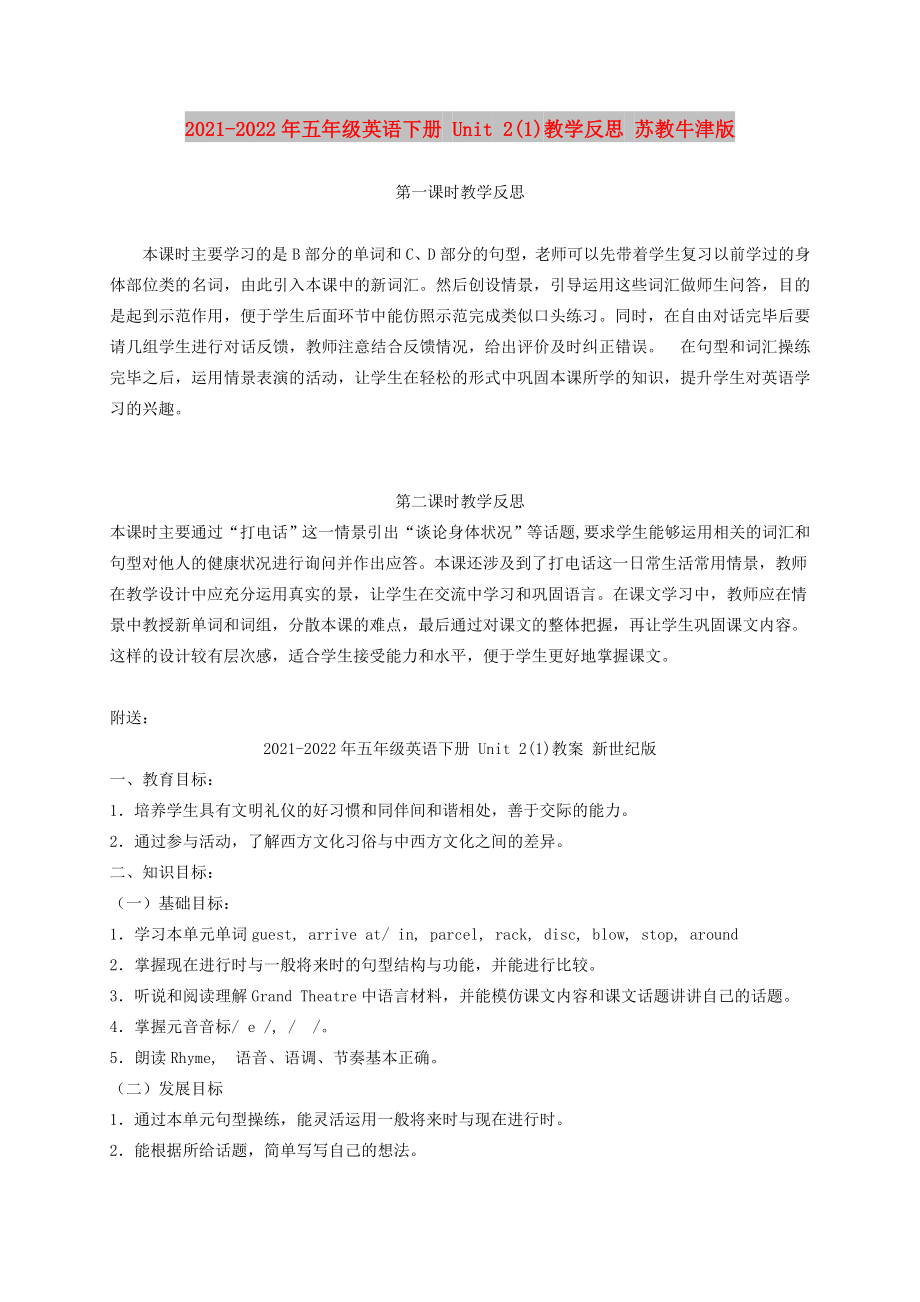《2021-2022年五年級(jí)英語下冊 Unit 2(1)教學(xué)反思 蘇教牛津版》由會(huì)員分享,可在線閱讀���,更多相關(guān)《2021-2022年五年級(jí)英語下冊 Unit 2(1)教學(xué)反思 蘇教牛津版(3頁珍藏版)》請?jiān)谘b配圖網(wǎng)上搜索����。
1�、2021-2022年五年級(jí)英語下冊 Unit 2(1)教學(xué)反思 蘇教牛津版
第一課時(shí)教學(xué)反思
本課時(shí)主要學(xué)習(xí)的是B部分的單詞和C、D部分的句型��,老師可以先帶著學(xué)生復(fù)習(xí)以前學(xué)過的身體部位類的名詞�����,由此引入本課中的新詞匯。然后創(chuàng)設(shè)情景����,引導(dǎo)運(yùn)用這些詞匯做師生問答,目的是起到示范作用�����,便于學(xué)生后面環(huán)節(jié)中能仿照示范完成類似口頭練習(xí)���。同時(shí)���,在自由對話完畢后要請幾組學(xué)生進(jìn)行對話反饋,教師注意結(jié)合反饋情況���,給出評(píng)價(jià)及時(shí)糾正錯(cuò)誤��。?在句型和詞匯操練完畢之后�����,運(yùn)用情景表演的活動(dòng)�����,讓學(xué)生在輕松的形式中鞏固本課所學(xué)的知識(shí)�����,提升學(xué)生對英語學(xué)習(xí)的興趣�。
第二課時(shí)教學(xué)反思
本課時(shí)主要通過“打電話”
2�����、這一情景引出“談?wù)撋眢w狀況”等話題,要求學(xué)生能夠運(yùn)用相關(guān)的詞匯和句型對他人的健康狀況進(jìn)行詢問并作出應(yīng)答���。本課還涉及到了打電話這一日常生活常用情景�����,教師在教學(xué)設(shè)計(jì)中應(yīng)充分運(yùn)用真實(shí)的景�,讓學(xué)生在交流中學(xué)習(xí)和鞏固語言��。在課文學(xué)習(xí)中�,教師應(yīng)在情景中教授新單詞和詞組,分散本課的難點(diǎn)�,最后通過對課文的整體把握,再讓學(xué)生鞏固課文內(nèi)容�。這樣的設(shè)計(jì)較有層次感�,適合學(xué)生接受能力和水平��,便于學(xué)生更好地掌握課文����。
附送:
2021-2022年五年級(jí)英語下冊 Unit 2(1)教案 新世紀(jì)版
一、教育目標(biāo):
1.培養(yǎng)學(xué)生具有文明禮儀的好習(xí)慣和同伴間和諧相處���,善于交際的能力����。
2.通過參與活動(dòng)���,了解西方文化
3����、習(xí)俗與中西方文化之間的差異����。
二、知識(shí)目標(biāo):
(一)基礎(chǔ)目標(biāo):
1.學(xué)習(xí)本單元單詞guest, arrive at/ in, parcel, rack, disc, blow, stop, around
2.掌握現(xiàn)在進(jìn)行時(shí)與一般將來時(shí)的句型結(jié)構(gòu)與功能�����,并能進(jìn)行比較。
3.聽說和閱讀理解Grand Theatre中語言材料�,并能模仿課文內(nèi)容和課文話題講講自己的話題。
4.掌握元音音標(biāo)/ e /, / /���。
5.朗讀Rhyme, 語音�����、語調(diào)、節(jié)奏基本正確����。
(二)發(fā)展目標(biāo)
1.通過本單元句型操練,能靈活運(yùn)用一般將來時(shí)與現(xiàn)在進(jìn)行時(shí)��。
2.能根據(jù)所給話題�,簡單寫寫自己的想法。
4��、三��、能力目標(biāo):能用兩種或兩種以上的時(shí)態(tài)講講自己所參加的活動(dòng)����。
四��、情感����、策略和文化等目標(biāo):
1.情感態(tài)度:教育學(xué)生熱情友善����,文明禮貌。
2.學(xué)習(xí)策略:尋找語言與情感的結(jié)合點(diǎn)�����,讓學(xué)生有話可說�,有話會(huì)說。
3.文化目標(biāo):讓學(xué)生了解中西方文化之間的差異����。
五、教學(xué)資源:
Student’s Book 5B P8—14, Cassette 5B Unit 2, Student’s Work Book 5B P10—P17, Pictures of words, Teaching transparencies.
六����、教學(xué)時(shí)間:七課時(shí)。(其中5課時(shí)新授��,2課時(shí)練習(xí)和復(fù)習(xí)����,練習(xí)冊隨教學(xué)進(jìn)度完成
5��、����。)
Lesson Plan (1): Wonderland
1. Pre-task preparation:
1. Read the rhyme together.
2. Ask the students to talk about the Spring Festival. Offer some help if they need.
(e.g. What did you do in the Spring Festival? Where did you go in Spring Festival? How did you feel in Spring Festi
6�����、val? Did you got a red packet? How much money? How did you spend the money?)
3. Students make a short dialogue in groups and then act in front of the class.
II. While –task procedure:
1.????? Maybe there were many people in your home during the Spring Festival. Who did you invite during the Sp
7����、ring Festival? (To elicit: guest)
2.????? When did they arrive at your house? (To elicit: arrive at =get to)
3.????? pare: “arrive in” and “arrive at”
4.????? What present did you receive? (To elicit: parcel, rack, disc)
5.????? What did you do at the party? (To elicit: blow bubbles, stop, a
8��、round)
6.????? Play the cassette: Wonderland.
Students listen and follow the tape.
7.????? Play the cassette again. Students listen and repeat. Pay attention to the pronunciation.
8.????? Let the students ask questions about the new words.
9.????? Read the new words and sentences in groups of f
9����、our.
III. Post-task activities
1.????? Ask the students to remember the new words in two minutes.
2.????? Listen and fill in the blanks.
gu__ __ t, arr__ ve, p__ __ cel, d__ sc, ra__ __, bl__ __, st__ p, ar__ __ nd
First students fill in the blanks individually. Then check the answer together.
10、
3.????? Divide the students into groups of four. Ask them to make sentences with the new words.
4.????? Invite individuals to say the sentences they have made.
5.????? Invite students to write their sentences on the board. Check the sentences together.
6.????? Read the sentences on the board together.
7.????? Decide which group is the winner.
 2021-2022年五年級(jí)英語下冊 Unit 2(1)教學(xué)反思 蘇教牛津版
2021-2022年五年級(jí)英語下冊 Unit 2(1)教學(xué)反思 蘇教牛津版

